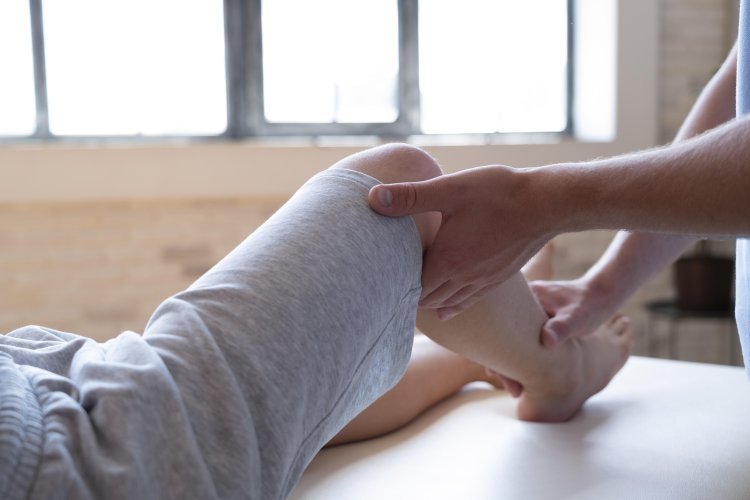15 Ways to Take Care of Your Knee Joints
One of the largest and one of the most complex joints present in our body – knees, are a vital part of our system that stands crucial for the mobility point of view.

One of the largest and one of the most complex joints present in our body – knees, are a vital part of our system that stands crucial for the mobility point of view.
This infers that protecting our knee joints shall be our foremost priority.
This is because our knee joints provide aid in walking perfectly, running, jumping, dancing, pedaling a cycle, kicking football, climbing stairs, or even bending them to play with our little kidos.
If we don’t keep our knees healthy, it would be difficult to do such activities as knees won’t be able to handle this amount of pressure.
Since knees are more prone to injuries, pain or any other chronic disorders, such as arthritis, there are many ways out there that we can lessen the impact of knee problems.
Taking care of your knee joints is crucial for maintaining overall movement and preventing yourself from getting bruised. Here are several effective ways to ensure the health and well-being of your knee joints:
- Maintain a Healthy Weight:
- Carrying excessive weight and putting more pressure on your knee joints increases the fear of joints getting worn and torn.
- Keeping your weight healthy by maintaining a balanced and nutritional diet and doing exercises on a regular basis helps in lowering down this pressure and enhances joint longevity.
- Strengthening Exercises:
- Engage in regular knee-strengthening exercises to build muscle around the joint, providing better support and stability.
- Put all your attention on exercises that target the quadriceps, hamstrings, and calf muscles.
- Leg lifts, squats, and lunges are excellent choices.
- Low-Impact Activities:
- Opt for low-impact activities that are gentler on the knees, such as swimming, cycling, or elliptical training.
- Such exercises provide cardiovascular advantages without putting much pressure on your knee joints.
- Proper Warm-Up and Stretching:
- Always engage in warm up exercises prior to indulging in physical activities so that your muscles and joints are prepared.
- Incorporate dynamic stretches to improve flexibility and reduce the risk of injuries.
- This is especially important before activities like running or intense workouts.
- Balanced Diet with Joint-Friendly Nutrients:
- Take a balanced diet enriched in nutritional values that enhances your joint health.
- Omega-3 fatty acids contain antiphlogistic properties. For instance, these are discovered in fish, nuts, and seeds.
- Calcium and vitamin D support bone health, while antioxidants help protect joints from damage.
- Hydration:
- Stay adequately hydrated to maintain the lubrication of your joints.
- Water, being an essential element, is necessary for the formation of synovial fluid, which also further helps in providing lubrication to the joints and lowering down the amount of friction.
- Dehydration can lead to increased joint stiffness and discomfort.
- Avoid Longer Hours of Sitting:
- Sitting for longer hours can contribute to your joint stiffness.
- Take a short set of intervals in between to stand, stretch, and walk around, especially if you have a sedentary lifestyle or a desk job.
- This helps maintain joint flexibility and prevents it from getting stiffed.
- Proper Footwear:
- Wear a pair of shoes that seem absolutely supportive and comfortable to your feet and also, they must be providing proper arch support as well.
- Ill-fitting footwear can alter your gait, putting extra strain on your knees.
- Consider using orthopedic inserts if necessary to enhance foot and knee alignment.
- Maintain Proper Posture:
- Keeping a good posture plays a major role in maintaining overall musculoskeletal health.
- Whether sitting or standing, maintain proper alignment of your spine, hips, and knees.
- This will lessen the unnecessary pressure on your knee joints and enhances better overall body functions.
- Appropriate Rest and Recovery:
- Give your body an adequate amount of time to rest and heal after doing intense physical activity.
- Overtraining can lead to joint overuse and increased susceptibility to injuries.
- Listen to your body and incorporate rest days into your exercise routine.
- Ice and Heat Therapy:
- In case of minor injuries or after strenuous activities, use ice packs to reduce swelling and inflammation.
- Heat therapy can help in relaxation of your muscles and also, improving your blood circulation.
- Alternating between ice and heat can be beneficial for managing knee discomfort.
- Avoid High-Impact Activities on Hard Surfaces:
- Limit activities that involve repetitive high-impact movements on hard surfaces, such as running on concrete.
- Opt for softer surfaces like grass or well-padded tracks to lessen the impact on your knee joints.
- Maintain Joint Flexibility:
- Regularly perform range-of-motion exercises to maintain joint flexibility levels.
- Engaging in activities like yoga can help in improving balance, adjusting flexibility levels, and joint movement, contributing to overall knee health.
- Listen to Your Body:
- Pay full attention to any symptoms of feeling discomfort or even slightest pain in your knees.
- If you experience persistent pain, swelling, or instability, consult a healthcare professional for a proper diagnosis and treatment plan.
- Physiotherapy:
- If you have a history of knee issues or injuries, consider working with a physiotherapist.
- They can create a customized exercise regime to provide strength to the muscles around your knees and address particular concerns.
Conclusion:
By incorporating these practices into your lifestyle, you can take proactive steps for the knee pain treatment in Delhi to preserve the health of your knee joints and reduce the risk of long-term issues.
Remember, consistency is the key, and it is never too late to start prioritizing the well-being of your knees so that you do not have to go and visit any knee joint surgeon in Delhi.
What's Your Reaction?
















